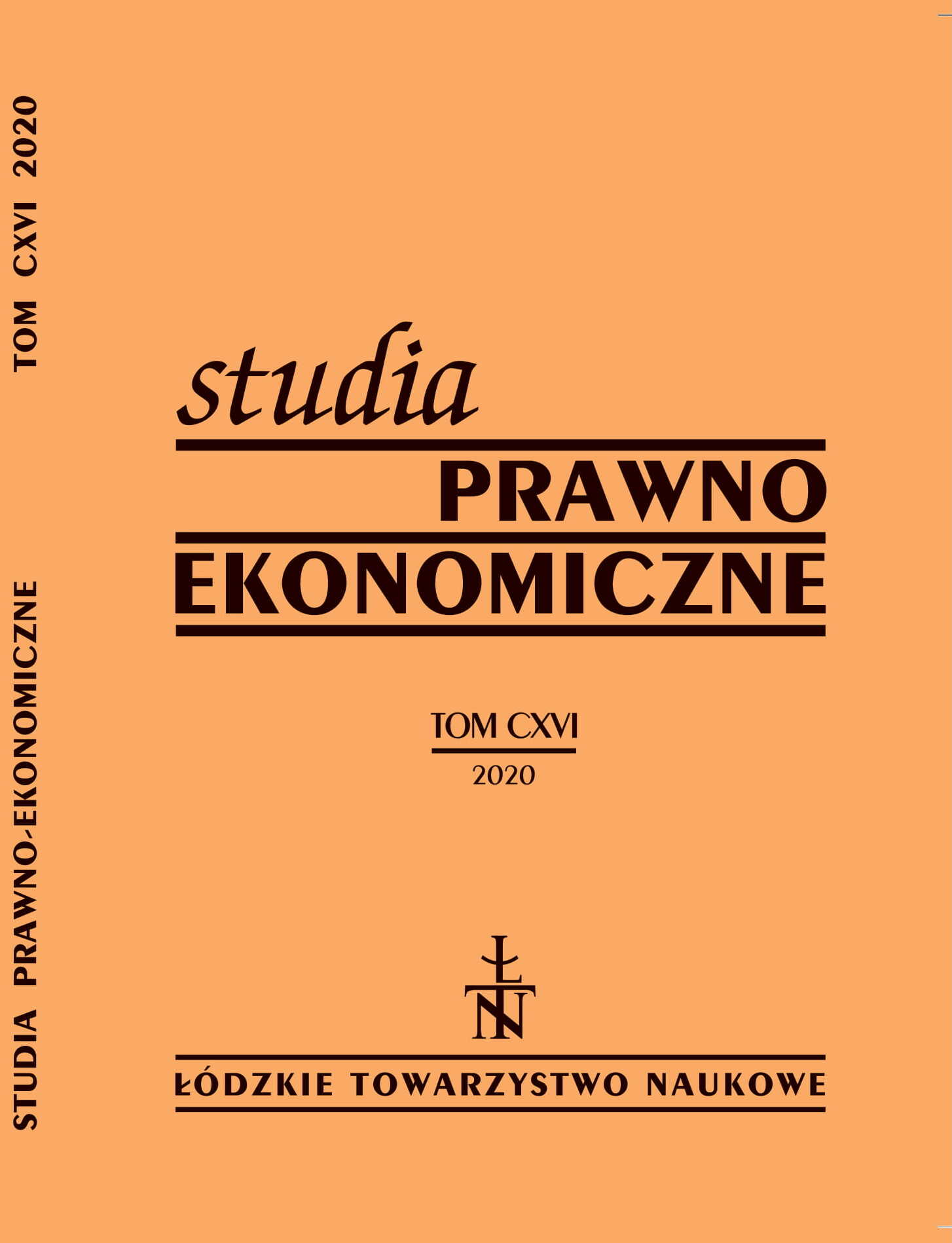Social Economy in Poland and economic development
DOI:
https://doi.org/10.26485/SPE/2020/116/9Keywords:
Social Economy, economic development, third sector of the economyAbstract
Background: The article presents selected considerations about the Social Economy in Poland, combining them with determinants and indicators of economic development. The social eco-nomy was treated as part of the National Global Economy. Due to the nature of the considerations, the conclusions from the analysis of available qualitative and quantitative data – included in the content – were preceded by a concise presentation of the assumptions of both areas indicated in the title. The article corresponds with another text by the author on Social Economy, published in 2019. To avoid repetition, the current text has narrowed the analysis to only a few definitional and research aspects.
Research purpose: The author diagnoses the current state of Social Economy development in Poland in the context of economic development – including its measures and determinants. Because the text submitted for publication is an introduction to the issue of the Polish social economy, most of it is theoretical. The indirect goal was to analyze the available qualitative and quantitative data preceded by an attempt to find current macro levels describing the indicated condition. The research hypothesis assumes that there is a relationship between the development of the social economy in Poland and the economic development of the State.
Methods: The article was based on a summary of the current literature on the subject (also English literature), reports, and available macroeconomic data. Therefore, it has a nature synthesizing socio-economic aspects.
Conclusions: As a result, the article is a compilation of several threads important for Poland’s economic development. The analysis shows that there is still a need to deepen the analysis of the state of the Social Economy in Poland, of which the following text is part. Based on current data and research literature, it was found that a more precise assessment of the state of development will be possible at the first half of 2020, i.e. immediately after the publication of quantitative data by the Central Statistical Office.
Downloads
References
Sprawozdanie z Realizacji Programu Fundusz Inicjatyw Obywatelskich na lata 2014–2020, edy¬cja 2017.
Sprawozdanie z Realizacji Programu Fundusz Inicjatyw Obywatelskich na lata 2014–2020, edycja 2018, Narodowy Instytut Wolności – Centrum Rozwoju Społeczeństwa Obywatelskiego, Warszawa 2019.
Uchwała nr 11 Rady Ministrów z dn. 31 stycznia 2019, zmieniająca uchwałę nr 164 z dn. 12 sierpnia 2014 roku w sprawie przyjęcia programu pod nazwą „Krajowy Program Rozwoju Ekonomii Społecznej”.
Balcerowicz L., Wolność i rozwój. Ekonomia wolnego rynku, Wydawnictwo Znak, Kraków 1998.
Chojnacka K.J., The Polish model of a social economy with the financial aspects and profits at background – from the general theory to practice, eFinanse 2019/15/3.
Czaja S., Milenijne Cele Rozwoju – wsparcie rozwoju zrównoważonego czy globalna fikcja?, w: „Rozwój – godność człowieka – gospodarowanie – poszanowanie przyrody”. Księga Pamiątkowa prof. zw. dr hab. Franciszka Piontka, PWE, Warszawa 2007.
Czaja S., Bedla A., Włodarczyk J., Wyzwania współczesnej ekonomii. Wybrane problemy, Difin, Warszawa 2012.
Defourny J., Develterre P., The Social Economy: The Worldwide Making of a Third Sector, w: L’économie sociale au Nord et au Sud, De Boeck 1999.
Gazda Z., O zastosowaniu koncepcji „kumulatywnej, okrężnej przyczynowości” do kategorii wyboru ekonomicznego, w: U. Zagóra Jonszta (red.), Dokonania współczesnej myśli ekonomicznej – znaczenie kategorii wyboru w teoriach ekonomicznych i praktyce gospodarczej, Katowice 2010.
Giza-Poleszczuk A., Hausner J., Introduction – The social Economy and Growth, w: A. Giza-Poleszczuk, J. Hausner (ed.), The Social Economy in Poland. Achievements, Barriers to Growth and Potential in Light of Research Results, Foundation for Social and Economic Initiatives, Warsaw 2008.
Granovetter M., The Impact of Social Structure on Economic Outcomes, Journal of Economic Perspectives 2005/19/1.
Grzeszczak J., Bieguny wzrostu a formy przestrzeni spolaryzowanej, Prace Geograficzne nr 173, Instytut Geografii i Przestrzennego Zagospodarowania im. Stanisława Leszczyńkiego, Polska Akademia Nauk, Warszawa 1999.
Hausner J., Ekonomia i społeczne imaginarium, Biuletyn PTE 2019/2.
Hausner J., Social economy and development in Poland, w: The Social Economy: International perspectives on economic solidarity, Ash Amin Ed., Zed Books, London 2013.
Mączyńska E., Pysz P. (red.), Społeczna Gospodarka Rynkowa: Polska i integracja europejska, Polskie Towarzystwo Ekonomiczne & Fundacja Konrada Adenauera, Przedstawicielstwo w Polsce, Warszawa 2018.
Menshikov V., Volkova O., Stukalo N., Simakhova A., Social economy as a tool to ensure national security, Journal of Security and Sustainability Issues 2017/7/2 [https://doi.org/10.9770/ jssi.2017.7.2(4)].
Mudura L.M., The Evolution of the Social Economy Concept in Europe, Annales of the University of Oradea, Economic Science Series 2015/24 (2).
Myrdal G., Przeciw nędzy na świecie, Państwowy Instytut Wydawniczy, Warszawa 1975.
Polak E., Rozwój zintegrowany a dobrobyt społeczno-ekonomiczny – trudności z pomiarem, Nie¬równości Społeczne a Wzrost Gospodarczy 2014/37 (1).
Potts J., Hartley J., How the social economy products innovation, Review of Social Economy 2015/73/3.
Ramotowski A., Gospodarka rynkowa podgryza własne korzenie, wywiad z prof. E. Mączyńską, Biuletyn PTE 2019/4 (84).
Stiglitz J.E., Fitoussi J.P., Durand M., Poza PKB. Mierzymy to co znaczenie dla rozwoju społeczno-gospodarczego, Biuletyn PTE 2019/2.
Stukalo N., Simakhova A., Global parameters of Social Economy clustering, Problems and Perspectives in Management 2018/16/1.
Visser W., Tohurst N. (red.), The World Guide to CRS. A country by-Country Analysis of Corporate Sustainability and Responsibility, New York, Routledge 2017.
Waters-Lynch J, Potts J., The social economy of coworking spaces: a focal point model of coordination, Review of Social Economy 2017/75/4 [DOI: 10.1080/00346764.2016.1269938].
fakty.ngo.pl/fakt/liczba-ngo-w-polsce; stan na 25.09.2019 r.
http://www.ekonomiaspoleczna.gov.pl/download/files/EKONOMIA_SPOLECZNA/ES_2021- 2027.pdf; stan na 4.10.2019 r.
https://poradnik.ngo.pl/jak-mozna-wspolpracowac-z-administracja; stan na 3.09.2019 r.
https://www.niw.gov.pl/wp-content/uploads/2019/09/Sprawozdanie_FIO_2018.pdf; stan na 3.09.2019 r.
Słownik języka polskiego, http://sjp.pwn.pl/szukaj/rozwój.html; stan na 17.08.2019 r.



